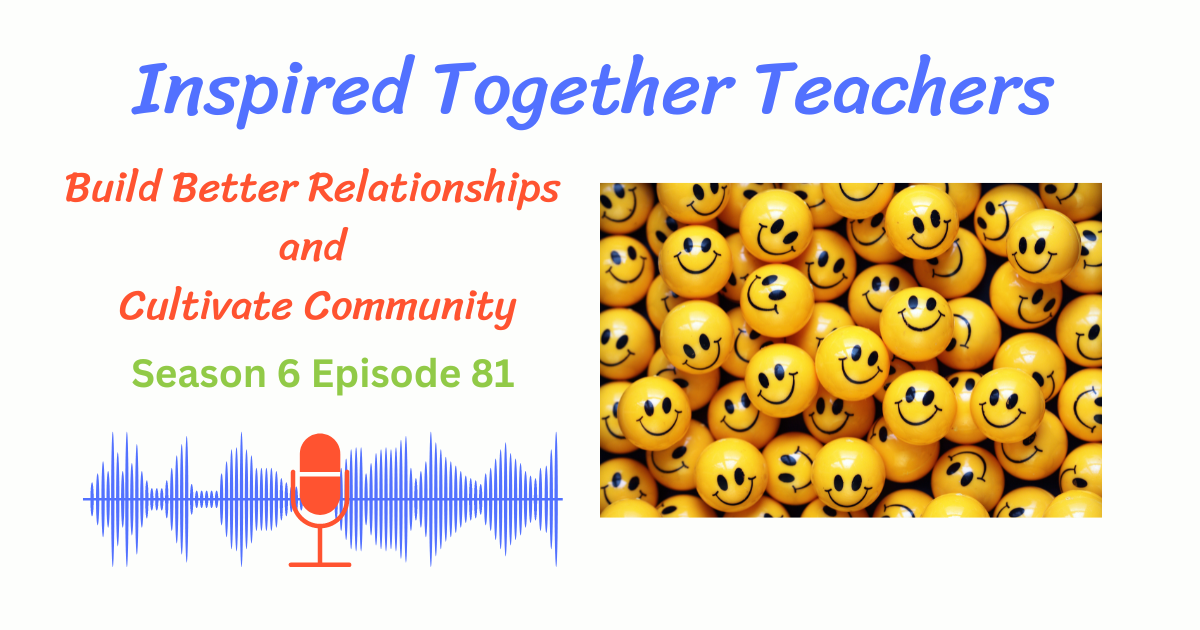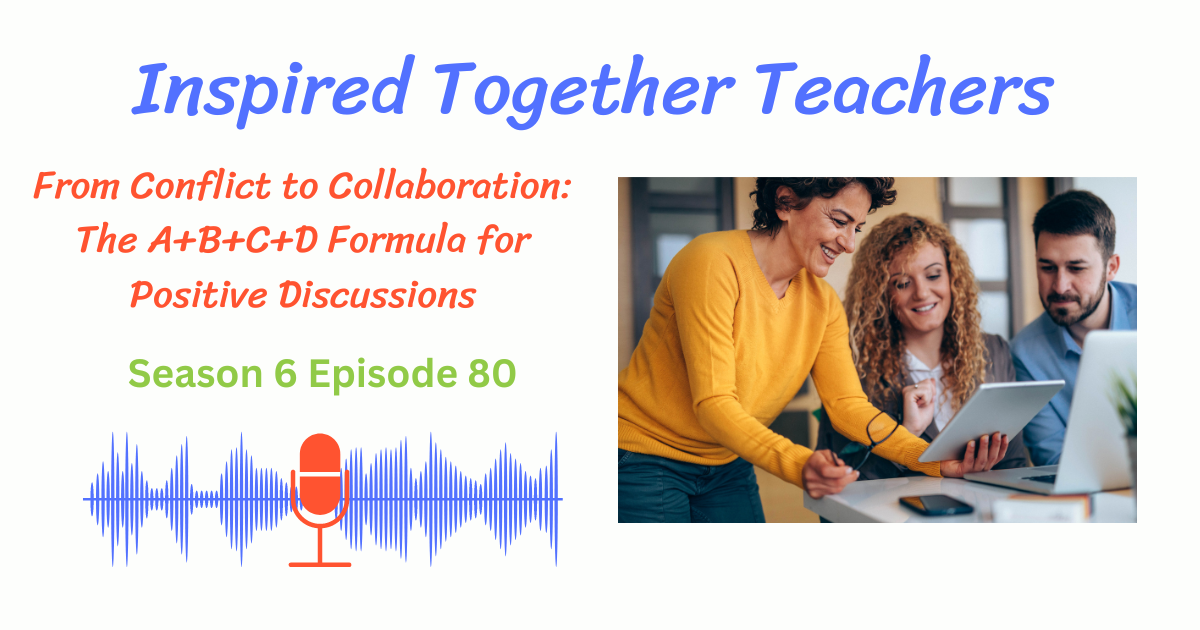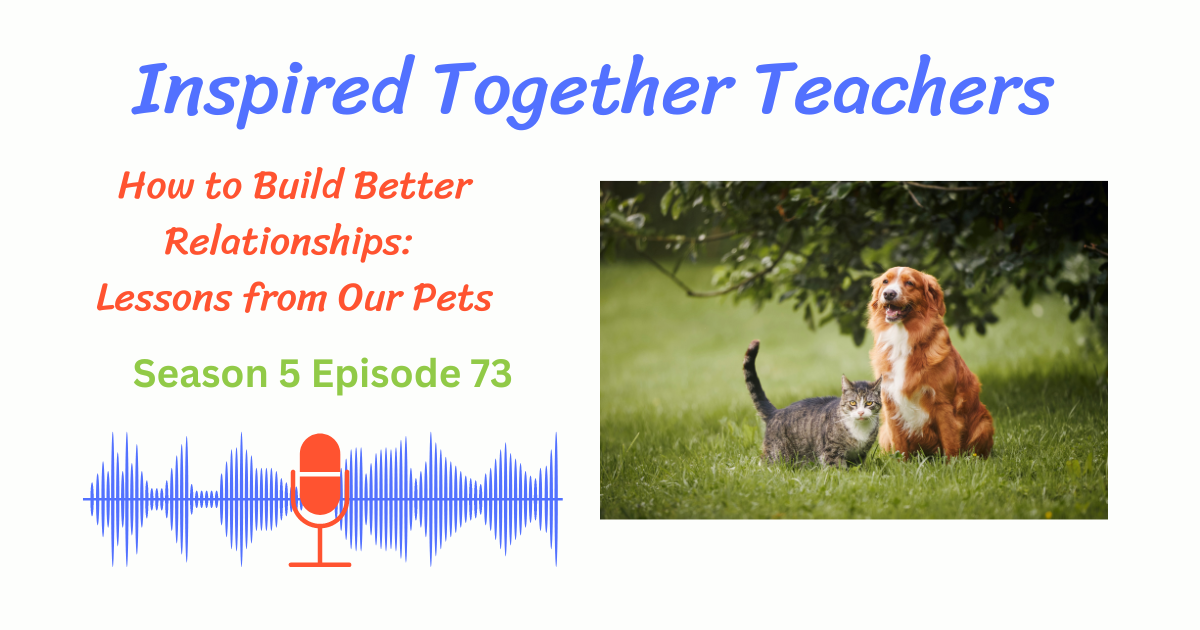Season 6 Episode 100
Check out this episode to learn the five most important lessons from the Inspired Together Teachers podcast that can help you in your teaching and in your life!
Show Notes:
Episode Summary:
Welcome to our 100th episode! Whether you have been with us from the beginning, or whether you are new to Inspired Together Teachers, we’re glad you’re here.
100 episodes is an achievement, and we’ve loved having weekly conversations with each other and with you.
You don’t get to 100 episodes without learning a few things along the way. In preparing for and sharing these episodes we’ve researched and discussed many topics. In this episode we’re going to share the five most important lessons that we’ve learned about teaching and life.
We’ll also wrap up our Elevate Your Life 2025 Series with more actions you can take to be your best in the next year.
In this episode:
As always, this is not a word for word transcript. For the best experience, please listen to the episode.
Introduction:
Welcome to our 100th episode. It feels like we should be popping some champagne, though instead we are having our usual coffee and conversation.
Michele: Paula, what’s your favorite thing about doing 100 episodes of this podcast?
Paula: I don’t even have to hesitate on this. My favorite thing is meeting people who say, “I know you, I listen to your podcast,” or even seeing people I already know and I haven’t seen them for awhile and they say, ” Oh my gosh, I feel like we are still connected because I listen to you and Michele all the time.” Or, getting that random text from a teacher friend saying how a particular episode resonates with them. That makes my teacher heart really happy.
Michele: My favorite thing is similar. I love getting messages, emails and texts from people in our Inspired Together Teachers community, especially people I already know and people we’ve never met, from other countries and random schools, from Nepal, or other places. I love seeing how you implement the ideas we’ve shared, or your stories, or even just your words of encouragement.
Paula: I love when you talk about the people from Nepal. We’ve built a community around the world and that is really unexpected to me, I never would have expected that.
Michele: Me either, but it is cool!
It turns out that community is a big deal. Today we are going to share the most important lessons we’ve learned from leading the Inspired Together Teachers Podcast for 6 seasons and 100 episodes, and we start with community.
Lesson #1 Community Matters
Our first lesson is that community matters. We’ve talked about building community a lot on this podcast. You can go back and listen to Episode 5 The Power of Community, or Episode 20 Build Your Star System.
You might also check out Episode 26 We Are the Average of the Five People We Spend the Most Time With or Episode 73 Build Better Relationships.
If you have downloaded the free Elevate Your Life in 2025 workbook and listened to the last three episodes, you may also have noticed that this is the last topic in the workbook. We’ve done full episodes on building your star system, and finding the people you need to support you in your life. We just finished Episode 93 about meaningful connections. Clearly, this is a topic of great importance to us, and to you as well.
Since, we have already discussed several of the activities in the workbook, we are just going to give remind you that your happiness and joy and the ability to live the life that is fulfilling is connected to the relationships you foster. The same is true with the relationships between you and your students. If you want to love teaching, build strong relationships with your students. It will sustain you when the going gets tough.
It’s a simple message, but an important lesson. Community matters.
Actress and comedian Amy Pohler offers great advice on this topic. She says,
“Find a group of people who challenge and inspire you, spend a lot of time with them, and it will change your life.”
Lesson #2 Change is Inevitable
As teachers, we learned early on that change is always happening and that we have to learn to be flexible. We often say, “Our favorite ‘F’ word is flexibility.” At the same time, we so often fight change.
We discussed this topic is a series in Episodes 52-55. In those episodes we discussed being prepared for change, adjusting your mindset and habits around change, deciding whether change is worth fighting for, and finally embracing change.
Change can be very frustrating and lead to a lot of stress and discontent. What we have learned is that we don’t have to spend a lot of time and worry over something we can’t control. Our time is often better spent handling change in ways that are productive. We can work within our circle of control, which lessens some of the angst we feel and allow us to feel more in control.
When it comes to change consider whether your choices are part of the problem or part of the solution. When it comes to change, our not wanting to deal with it, pretend it’s not there, or getting upset about the change just gets in the way. It is just worrying and not productive. It is part of the problem.
Lesson #3 Chronic Stress is Not Inevitable
Notice that we did not say that stress is not inevitable. What we said is that chronic stress is not inevitable. Chances are high that you will feel stressed at some point, probably daily! Challenging things happen. Life is busy and sometimes unpredictable. Bad things happen. You may feel stressed, but you don’t have to live in stress.
Of all the work we’ve done in the past few years, this is some of the most impactful.
We’ve done some of our best learning and best work around the topic of stress and real self-care. We’ve also connected stress and self-care to our work with the Enneagram. We’ve dealt with this in presentations and workshops.
Our biggest take away from our learning on stress is that you have to do something to remediate stress. You need to take steps to complete the stress cycle. This means that you actively try to let the stress out of your body.
For example this might mean physical activity such as running, shaking, shuddering, crying, muscle-stretching, deep breathing, dancing or tensing and releasing all of your muscles.
Other ways of reducing stress include positive social interactions, laughing, showing affection, a six-second kiss, hugging for 20 seconds, or creative expressions such as art, music, writing or drama.
The key is to break that stress cycle.
Lesson #4 Your Environment Matters
In this lesson learned, we aren’t talking about relationships as much as we are talking about your environment. Your environment affects everything from your mindset around who you are and what is possible for you to your sense of comfort, ability to relax, and ability to de-stress.
Your environment might include the books you read, the shows you watch, or the places you go. It also includes your home, your classroom environment and even your neighborhood.
Paula: One of my favorite things about this theme is that we have talked a lot about how you can make changes to your environment. The environment that you were born into or work in or live in doesn’t have to be your environment forever. You can make change. You have the power to change the environment.
Another part of this is understanding the environment of the students you work with. You can create a classroom where students feel safe and welcome. You can understand where the people in your life come from.
I was talking with a principal who had the teachers discover the environment the students come from. He was the principal of an inner city school in a big city. He gave teachers the name of a student. He asked the teachers to walk from the school to the student’s home and back to school to understand what the students go through every day. He wanted them to understand their environment. We’ve talked about empathy a lot, and understanding the student’s environment builds empathy. Understanding what your own environment is doing to you is also important.
Michele: This applies to you personally as well. For example, my environment is my haven. I can relax, enjoy looking at the calm spaces around me. I try to eliminate clutter, and the things I have in my home are purposefully chosen. I have amazing candles, and my favorite thing is reading a book by the fire. Home is where I go to de-stress and return to calm. It is like oxygen to me. Think about how you feel when you are surrounded by chaos. It is hard to concentrate and hard to relax. Both things are key to our wellbeing.
The theme we have discovered is that your environment matters. Think about what that means to you. Look at your home and your classroom. Is it an environment that you love to be in? Know that if your environment is not what you would like it to be, you have the power to change it.
Lesson #5 Your Happiness is an Inside Job
Our most popular post on our website is about how to create more joy in the classroom. People want more joy in their lives.
We often share findings from happiness researchers because the data is so overwhelming about what it takes to find happiness and joy.
What it comes down to is that no one lives a charmed, magical, perfect life. We will all deal with many challenges. The difference between people who are generally happy and who find joy and fulfillment in their life is that they choose to find things that bring them joy and fulfillment.
Happiness is not doled out like a gift. Everyone has the opportunity to be happy. Looking at the good things in life is a choice! There are people who live in horrible circumstances, live through wars, and horrific tragedies, but despite it all, they chose to find their own moments of happiness. It is possible. You can choose it.
We all know someone who tends to be negative and grumpy all the time. They see the glass half empty. They are often difficult to be around. You don’t have to believe in manifesting what you want in order to see that people who always look at the negative in life don’t attract a lot of positive, optimistic people in their lives. Who wants to hang around someone who is negative all the time?
The opposite is true, again, whether or not you believe that you can manifest something, when you are happy, optimistic, your open and willing to see beyond problems and into positive solutions, you will attract like- minded people into your life. You attract others based on who you are and how you choose to act.
That’s really the key to the whole manifesting idea. It’s not like some magical gift that is just handed out to you. It’s in how your actions cause results.
If we were to narrow down all the happiness research it would boil down to these two things- having meaningful relationships and choosing to find happiness and joy.
Conclusion:
We have loved bringing 100 episodes to you. Our goal was to create a podcast to help us all create our best work life and home life so that we can live our best lives. We find our joy in working with each other and with you. Thank you for joining us and being a part of our Inspired Together Teachers community.
Recap:
Our 100 podcast episodes have allowed us to research and discuss many topics. The five lessons we shared to today are among the most impactful things we’ve learned while sharing this podcast. Here they are one more time: Community matters. Change is inevitable. Chronic stress is not inevitable. Your environment matters. And lastly, your happiness is an inside job.
Resources mentioned in this episode:
These are linked in the transcript above.
Quote:
“Find a group of people who challenge and inspire you, spend a lot of time with them, and it will change your life.”
Amy Pohler
Connect with the Inspired Together Teachers Community:
Website: https:www.inspiredtogetherteachers.com
Instagram: Inspired-Together-Teachers
Facebook: Inspired Together Teachers
Inspired Together Teachers Network Facebook Group
Linked In: Inspired Together Learning
More About Inspired Together Teachers:
Are you a teacher struggling to balance your best work with your best life?
If you are dedicated and caring but often overwhelmed and exhausted, join us at Inspired Together Teachers. We’ll give you inspiration, strategies and tips that help you navigate life’s challenges as a stronger, more confident, and more joy filled person, both in and out of the classroom.
Inspired Together Teachers will give you practical tools to experience more of what matters most in your life.
Co-hosts Paula Schmidt and Michele Vosberg are award winning educators with the experience and skills to help teachers thrive in life and work. They’ve taught at all levels, worked with thousands of teachers, and conducted workshops around the world. They are also the authors of the #1 best-selling book The Inspired Teachers Journal: A Weekly Guide to Becoming Your Best Self.
Paula and Michele would love to have you to join them on their quest to lived inspired lives.






